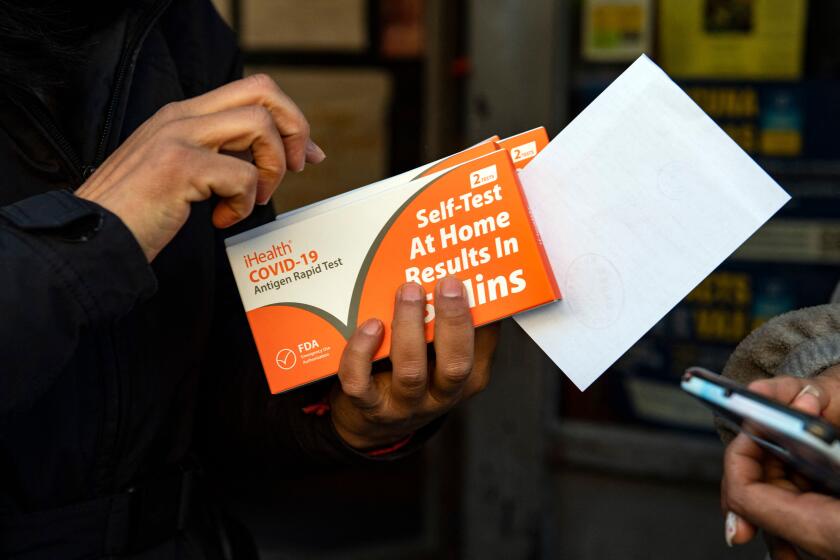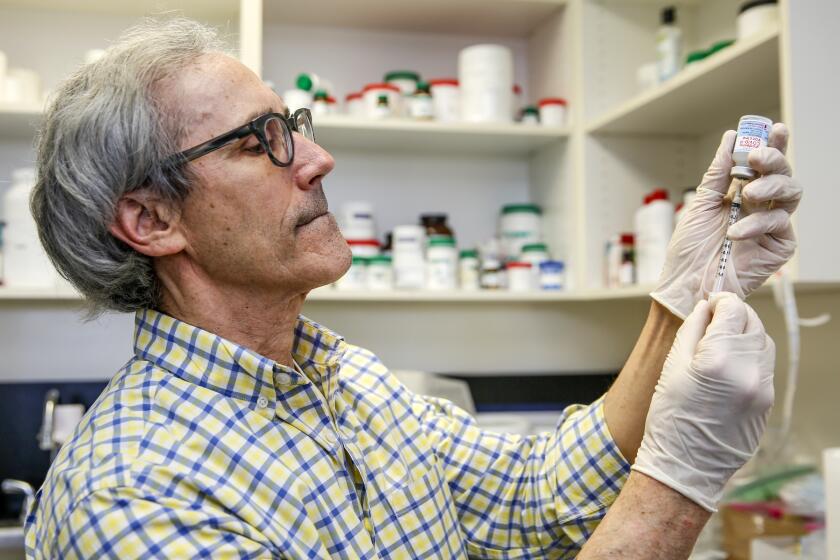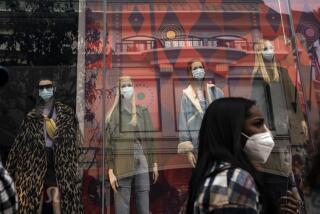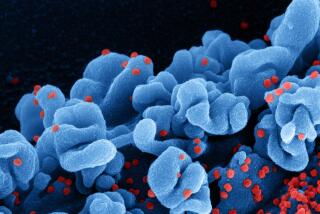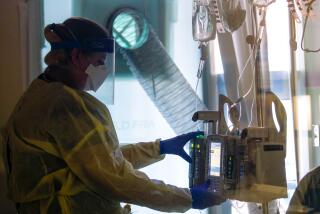Contemplating a COVID party for your kids? It’s still a bad idea
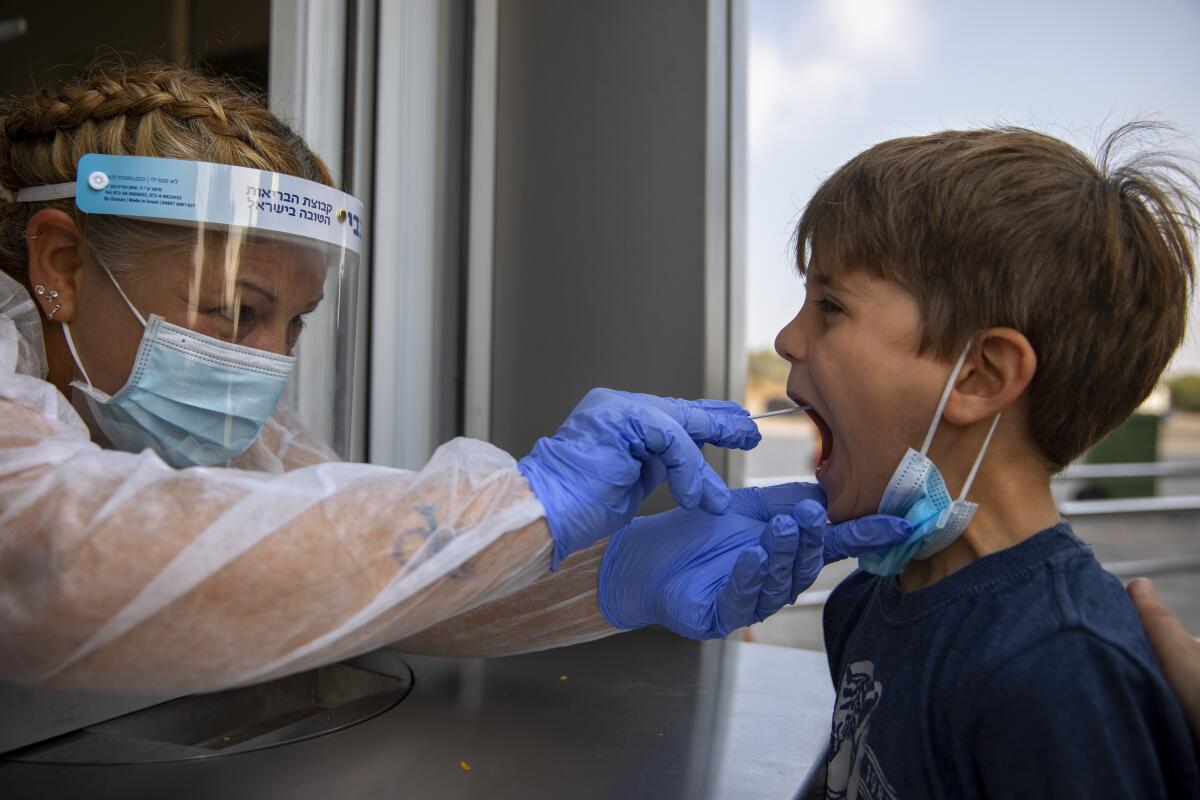
- Share via
In the days before a vaccine for chicken pox became widely available, some parents would host “chicken pox parties” amidst an outbreak to try to ensure that their kids wouldn’t be left out of the wave of infections. The thinking was that chicken pox was a mild disease for kids but worse for adults, and catching it early would provide a lifetime of natural immunity.
Now the idea of “chicken pox parties” is back — but this time, it’s for COVID-19. The Omicron variant seems less dangerous than earlier versions of the coronavirus and harder for kids to avoid now that they’re back in school, so why not get it out of the way?
The Times posed this question to four COVID-19 experts, three of whom are also pediatricians who specialize in infectious diseases.
While they expressed sympathy for parents frazzled by the seemingly endless pandemic, they all said there’s no real upside to exposing your child to the Omicron variant — and plenty of potential downsides.
The notion of deliberately trying to catch an infectious disease “is not 21st century thinking, it’s not 20th century thinking, it’s 19th century thinking,” said Dr. James T. McDeavitt, dean of clinical affairs at Baylor College of Medicine in Houston.
There was some wisdom in the strategy of yore, and that helps explain why people might want to go that route again with the coronavirus (especially parents who remember attending chicken pox parties as children). But the parallels between then and now are weak, as are the possible rationales for seeking out the Omicron variant.
Is the Omicron variant mild?
McDeavitt said Omicron tends to be mild in children, “but sometimes it’s not.”
Dr. Dean A. Blumberg, chief of pediatric infectious diseases at UC Davis Children’s Hospital, said that of the more than 7 million pediatric cases of COVID-19 in the United States since the start of the pandemic, more than 29,000 have resulted in hospitalizations and more than 1,000 were fatal. So while damaging complications aren’t common, he said, “you’re basically rolling the dice and hoping your child doesn’t have one of these severe outcomes.”
Dr. Aaron M. Milstone, a pediatric infectious diseases specialist at Johns Hopkins Children’s Center, noted that infections are especially risky for children who haven’t gotten their COVID-19 shots.
“We are seeing kids who are getting admitted to intensive care with acute COVID,” Milstone said, “and it’s happening more frequently to unvaccinated kids than vaccinated kids.”
The child died in December, officials said. No COVID-19 vaccine has been authorized for use in children younger than 5.
One thing we don’t yet know about Omicron, he added, is whether it will be associated with multisystem inflammatory syndrome, a condition that showed up in some children (and adults) four to six weeks after they had COVID-19. MIS-C is a potentially fatal disease that may cause lingering heart damage.
“We saw our first cases of Omicron after Thanksgiving,” he said. “We’re right at that place where we don’t know whether we’re going to have a huge surge of MIS-C as a result of Omicron. We didn’t see that with Delta; we don’t know with Omicron.”
Virologist Paula Cannon, an associate professor of microbiology at USC’s Keck School of Medicine, said Omicron may turn out to be milder overall, but we don’t know whether it will be milder for children. It’s easy to imagine a variant that has different effects on patients in different age groups, she said.
And even if an infection doesn’t have much effect on an individual child, Cannon said, the child may spread the coronavirus to parents, grandparents, friends and “the whole universe the child will interact with.” And you can’t know if the result will be as benign for everyone “in the ripple of people who could be infected as a consequence of your child being infected,” she said.
As McDeavitt put it, chances are that if you catch the Omicron variant, your symptoms won’t be severe, but “if you don’t get it, you won’t get sick at all.”
Is infection inevitable?
Part of the appeal of a COVID-19 party is the idea of getting some relief from the relentless anxiety about staying one step ahead of the virus, Cannon said. It’s a “let’s just rip off the Band-Aid” approach, fed by the belief that the coronavirus is ultimately inescapable.
But McDeavitt argued that getting infected isn’t inevitable, especially if people wear masks, maintain social distance and get vaccinated and boosted.
Although coronavirus vaccines aren’t as effective against Omicron as they are against earlier variants, they are “cheap, effective and widely available,” he said. There’s no reason to deliberately take on the risk of an infection “when there are better alternatives.”
Californians have been racing to buy at-home testing kits. But chances are that the results aren’t making their way into the public health system.
Granted, there’s no vaccine available yet for children under age 5. But Cannon said those kids will qualify soon enough. “There is definitely a reason to keep your child not infected until they’re eligible for vaccination,” she said.
Milstone said Omicron may seem omnipresent in places where 30% to 40% of the COVID-19 tests are coming back positive. But that doesn’t mean 30% to 40% of the general population is infected. And besides, this wave will fade, just as the previous ones have, and the risk of exposure will shrink.
“Not everyone gets flu every year,” Milstone said. “Not everyone gets a cold every year.”
Will natural immunity protect me longer than a vaccination?
Cannon said it’s hard to tease out the immunity differences between people who’ve been infected but not vaccinated, people who’ve been vaccinated but not infected, and people who’ve been both infected and vaccinated.
Nevertheless, Blumberg said, if you look at all the research, the vast majority of studies show that people have higher, more consistent and longer-lasting immunity as a result of vaccination than from an infection. And even if your child catches COVID-19, he said, you’d still want them to be vaccinated to reduce the risk of reinfection.
“We know that people can get reinfected with COVID,” Blumberg said.
In people who got a booster shot, levels of neutralizing antibodies exceeded the peak that followed two doses of COVID-19 vaccine.
Because Omicron is so infectious, Cannon said, the hope is that we’ll end up with a population that is largely immune to the variant. But we don’t know whether that immunity would be enough to stop another wave, or whether a new variant will come along that can get past the defenses built up in response to Omicron, she said.
One reason some parents don’t want to vaccinate their children, Blumberg said, is their concern about rare yet potentially serious side effects such as myocarditis, an inflammation of the heart. But federal health officials found that the rate of myocarditis was 100 times higher for children who had COVID-19 than for children who were vaccinated, he said. And the risk of myocarditis combined with MIS-C was 1,000 times higher.
Can I isolate Omicron once my child has it?
This is perhaps the biggest problem with a COVID-19 party, experts said.
“Clearly, if kids get sick, they’re going to spread it to people around them,” Milstone said. Even if the parents are vaccinated, if their kids bring the Omicron variant home, “it just flies through the house.”
Added McDeavitt: “It’s a bad idea in the absence of vaccines. I think it’s a stupid idea in the presence of vaccines. ... It will cause people to get sick unnecessarily, and some people will get very sick unnecessarily.”
Parents have to think about the disruption and risk this would pose not only to their lives, but to the lives of everyone else their kids may come in contact with, Milstone said. “People have to decide whether they’re going to just think about their own well-being or think about their community well-being,” he said.
That includes the effect all these extra cases will have on the local healthcare system. If hospitals become overwhelmed with COVID patients, Milstone said, they won’t be able to care for other seriously ill and dying people.
“A lot of us in medicine and public health are kind of pleading with people to think about the community perspective,” he said.

